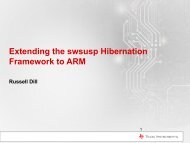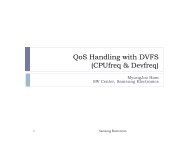IO-less Dirty Throttling - The Linux Foundation
IO-less Dirty Throttling - The Linux Foundation
IO-less Dirty Throttling - The Linux Foundation
You also want an ePaper? Increase the reach of your titles
YUMPU automatically turns print PDFs into web optimized ePapers that Google loves.
Write and writebackUSER APPLICAT<strong>IO</strong>NKERNEL FLUSHER THREAD================== =====================dirty pages andwriteout pages afterimmediately returndirty expired (>30s)avoid blocking appsaggregate write <strong>IO</strong>
<strong>The</strong> flusher thread(s)Initiate writeback <strong>IO</strong> in backgroundOne flusher per storage device.$ ps axPID TTY STAT TIME COMMAND2322 ? S 0:01 [flush-8:0]. 12681 ? S 0:00 [flush-btrfs-1]
<strong>Dirty</strong> throttlingTo limit dirty pages.. by slowing down heavy dirtiers.
<strong>IO</strong>-full balance_dirty_pages()sys_write()balance_dirty_pages()i f (over_bground_thresh ())start_background_writeback ();i f(dirty exceeded)writeback_inodes(pages_dirtied * 3/2);
Problem: disk seeks + lock contentionsflusher task 1 task 2 task 3*************** concurrently working on ****************+---------+ +---------+ +---------+ +---------+| | | | | | | || | | | | | | || | | | | | | || inode 1 | | inode 2 | | inode 3 | | inode 4 || | | | | | | || | | | | | | ||.........| |.........| |.........| |.........|+---------+ +---------+ +---------+ +---------+
Problem: large latenciestasks in deep <strong>IO</strong> path are not killablehurts responsivenesshurts throughput (pipeline stalls).loop {.}READ from netWRITE to disk# long sleeps => idle networkrsync to a loaded server:pause time: 0-3s 0-300ms 60-70msthroughput: 1 +12.4% +63.5%
30s pause (NFS, 1-dd)NFS, 1 dd, 3G mem, 2.6.38-rc7
3s pause (xfs, 8-dd)xfs, 8 dd, 4G mem, 2.6.38-rc7
Let’s do controllable sleeps!I/O ⇒ sleepi f (dirty exceeded)- writeback_inodes(pages_dirtied * 3/2);+ sleep(pages_dirtied / task_ratelimit);and rethink dirty balancing ……
Balancing dirty rateapps’ dirty progressdisk write progress
Balancing dirty pagesglobal dirty limitglobal dirty pagesglobal dirty setpointper-disk dirty pagesper-disk dirty setpoint
<strong>IO</strong>-<strong>less</strong> dirty throttling/balancingDo proper sleep()s during sys_write():.1 throttle each task’s dirty rate around write_bandwidth / N.2 balance the global dirty pages around global dirty target.3 balance each disk’s dirty pages around the disk’s dirty target
per-disk write bandwidth sharesbdi 8:0 bdi 8:48N = 2 N = 1
<strong>The</strong> 3 axes of sleepingIn sys_write(), when dirtied enough pages:\+---> LATENCY CONTROL/pages_dirtiedsleep(---------------------------------------------)pos_ratio * balanced_ratelimit| |v |= 1.0 if at setpoint v> 1.0 if below setpoint re-estimated< 1.0 if above setpoint on every 200msPOSIT<strong>IO</strong>N CONTROLRATE CONTROL
Controllable sys_write() latencyi f(enough pages dirtied)sleep(pages_dirtied / TASK_RATELIMIT);Controlling pages_dirtied controls pause time.
Reasonable sys_write() latencies100MB/s => insert 10-seconds-long sleeps into 1GB writes.10 * sleep(1000ms) # too long latency100 * sleep(100ms)1000 * sleep(10ms).10000 * sleep(1ms) # too much CPU overheads
Pause time policies10ms for 1-ddmore dirtier tasks ⇒ longer pause time200ms max pause
Regressions on tiny pages_dirtiedWORKLOAD 64kb random writes and reads+writesPROBLEM paused on every few pages dirtiedSOLUT<strong>IO</strong>N increase pause time to increase pages_dirtied
This task: pauses 45-50ms on every 57 pages dirtiedbalance_dirty_pages() do sleeps in a for(;;) looppause is the pause time in current looppaused is the accumulated pause times in previous loopsxfs, 10 dd, 4G mem, 2.6.39-rc2-dt7+
Smoothness: bumping ahead (legacy kernel)xfs, 8 dd, 4G mem, 2.6.38-rc7
Smoothness: straight lines3 superposed lines⇒ excellent smoothness and fairness among the 3 dd tasksxfs, 10 dd, 4G mem, 2.6.39-rc2-dt7+
Balanced ratelimitsleep(pages_dirtied / balanced_ratelimit);That throttles the task’s dirty rate tobalanced_ratelimit = write_bandwidth / N,whereN := number of dirtier tasksis to be estimated.
Estimating N (theory)When started N dd, throttle each dd atratelimit_0 (any non-zero initial value is OK)After 200ms, we measuresdirty_rate = # of pages dirtied by apps / 200msto estimate N:N = dirty_rate / ratelimit_0Now the tasks can be rightfully throttled atbalanced_ratelimit = write_bandwidth / N
...balanced_ratelimit estimated in 200ms!However, real world is not perfect . . .
Unstable balanced_ratelimitext4, 1 dd to HDD + 1 dd to USB stick, 3G mem, 3.2.0-rc3
Balanced dirty ratelimit (practice)COMPRESS SMALL NOISESbalanced_ratelimit is fluctuating, has estimation errors due to controllags and write_bw errors, asking for step-by-step approximations:dirty_ratelimit => balanced_ratelimit (the closer, the smaller step)FILTER OUT LARGE NOISES<strong>The</strong>re is no need to update dirty_ratelimit during a stable workload,which only makes it susceptible to (big) noises. So do it defensivelyand update dirty_ratelimit when balanced_ratelimit and task_ratelimitare at the same direction of dirty_ratelimit.if (dirty_ratelimit > both balanced_ratelimit, task_ratelimit)dirty_ratelimit => max(balanced_ratelimit, task_ratelimit)if (dirty_ratelimit < both balanced_ratelimit, task_ratelimit)dirty_ratelimit => min(balanced_ratelimit, task_ratelimit)
Balanced dirty pages- task_ratelimit = balanced_ratelimit;+ task_ratelimit = balanced_ratelimit * pos_ratio;.Negative feedback control.pos_ratio = 1.0if (dirty < setpoint) scale up pos_ratioif (dirty > setpoint) scale down pos_ratio.if (bdi_dirty < bdi_setpoint) scale up pos_ratioif (bdi_dirty > bdi_setpoint) scale down pos_ratio
Paradigm change
Global control line^ pos_ratio|| ||2.0 .............*| .*| . *| . *| . *| . *| . *1.0 ................................*| . . *| . . *| . . *| . . *| . . *0 +------------.------------------.----------------------*------------->freerun^ setpoint^ limit^ dirty pages
di control linespan = (8*write_bw) in 1-disk case and^ pos_ratiotransits to (bdi_thresh) in JBOD case.| *| * ||1.0 .......................*| . *| . *| . *| . *| . *| . *| . *| . *| . *| . *| . *1/4 ...............................................* * * * * * * * * * * *| . .| . .| . .0 +----------------------.-------------------------------.------------->bdi_setpoint^bdi dirty pages
Over-dirtying exampleUKEY accumulated much more initial dirty pages than its bdi goal.=⇒Bring dirty pages down by throttling the task at 1/4 write bandwidth.xfs, 1 dd to UKEY + 1 dd to HDD, 3G mem, 2.6.39-rc2-dt7+
Reasonable feedback in all mem/bw combinationsPolicies are:.1 global control line: adapts to dirtyable memory size.2 bdi control line: adapts to write bandwidth (except in JBOD)Designed for:.1 small dirty_setpoint, large write_bw: global line will take control.2 large dirty_setpoint, small write_bw: bdi line will take control.3 JBOD case: bdi_dirty_setpoint fluctuates proportional to dirtyablememory size; do weak bdi position control
1-disk case: fluctuations
1-disk case: fluctuations
1-disk case: fluctuations
1-disk case: fluctuations
JBOD case: large memoryext4, 4-HDD JBOD, 1 dd per disk, 8GB dirty limit, 2.6.32-rc3-pause6+
JBOD case: large memoryext4, 4-HDD JBOD, 10 dd per disk, 8GB dirty limit, 2.6.32-rc3-pause6+
JBOD case: small memoryext4, 4-HDD JBOD, 1 dd per disk, 100MB dirty limit, 2.6.32-rc3-pause6+
JBOD case: small memoryext4, 4-HDD JBOD, 10 dd per disk, 100MB dirty limit, 2.6.32-rc3-pause6+
Roll it up.on write() syscall.balance_dirty_pages(pages_dirtied){task_ratelimit = bdi->dirty_ratelimit * bdi_position_ratio();sleep(pages_dirtied / task_ratelimit);}..on every 200ms.bdi_update_dirty_ratelimit(){N = dirty_rate / task_ratelimit;balanced_ratelimit = write_bw / N;}.update bdi->dirty_ratelimit torwards balanced_ratelimit,regulated by task_ratelimit
What’s next.1 per-memcg dirty limits.2 write_bps throttling <strong>IO</strong> controller.3 proportional weight <strong>IO</strong> controller (challenging)
Thank you!

















